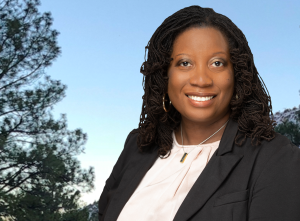 Darina Castillo, Ph.D., earned her doctorate in environmental engineering sciences in 2013. After graduating, she accepted a position at the U.S. Department of Energy Office of Legacy Management. She gives a brief overview of her journey to her position as site manager and what she is doing to inspire those who come after her.
Darina Castillo, Ph.D., earned her doctorate in environmental engineering sciences in 2013. After graduating, she accepted a position at the U.S. Department of Energy Office of Legacy Management. She gives a brief overview of her journey to her position as site manager and what she is doing to inspire those who come after her.
What inspires you?
I’m inspired by people and opportunities to overcome challenges. I am inspired by finding opportunities to create solutions to problems and opening doors for others when they may not see the path ahead of them.
Who helped you get where you are today?
I have had many people support me along the journey. These include my immediate and extended family, mentors, advisors and friends from programs and organizations that I have been involved with. These include Dr. Anne Donnelly, who is currently with the UF Center for Undergraduate Research. Previously, she was the program director for the SEAGEP Program and that was instrumental in providing funding for the first few years at University of Florida. My co-advisors Dr. David Kaplan and Dr. JoAnn Mossa who ensured that I developed the skills necessary to complete my dissertation and become the multifaceted environmental engineer that I am today. As my dissertation advisor, Dr. Kaplan was able to get me through that last year of my graduate studies. Dr. Mossa is in the Geography department, and she was co-chair for my dissertation. She was pivotal to the success of my work because she helped me develop my dissertation topic and provided me opportunities even though the Geography department wasn’t my home department. I spent more than half my time in the Geography department under her tutelage, so she was a very important component, and she continues to find opportunities to either enhance my work or utilize the work that we did together.
How do you hope to inspire the next generation?
I hope to inspire the next generation by continuing to model that hard work and attitude can open doors that they never knew existed. Additionally, I hope to inspire the next generation by modeling, seeking out opportunities, and not putting boundaries on myself—and this is something I have to tell myself that sometimes because it’s tough. Also, continuing to be a resource to those that come behind me so that they can either follow my path or create new paths for themselves.
Can you describe your role in the Department of Energy?
The position that I have today is site manager for the Department of Energy Office of Legacy Management, and that organization’s role is to conduct long-term stewardship for post-Cold War and Manhattan Project sites across the country. I was unaware that this career path existed before I started the job. I was able to get the position by seeking out the Presidential Management Fellowship. I was awarded the Presidential Management Fellowship, which provided the opportunity for me to apply for a wide range of federal positions with the U.S. government. It put my name in a list preselected candidates, so the office was able to find me through that talent acquisition bank. My position really matches what my expertise is and my historical background. I’ve been working in the field of environmental engineering and civil engineering starting just out of high school and that gave me a breadth of experiences in the field, which is required from my position. So, one day I could be doing environmental sciences—looking at water quality data, but another day I’ll be spending most of my time doing project management and writing up budgets and cost estimates.
How does being a Black woman in the field help you mentor the next generation?
I’m probably one of the only African American people in the technical arena of the office and that provides opportunities for me to provide a different perspective and mentor others including students that we bring into the department. We bring in interns each year and I haven’t worked directly with interns, but I usually get an opportunity to have one-on-one conversations with them. I have been able to leverage my past experiences such as being a past regional leader of the National Society of Black Engineers; that experience has allowed me to connect the Department of Energy to the universities across the West Coast, where they may not be aware of the expertise within the various universities. It’s been a little bit of both ways where people can come to me and I can explain what the department does and how they fit in, or the department can come to me with their recruiting needs and I can say, ‘you know go look at Cal Poly,’ or ‘Go look at Sacramento State,’ which is my alma mater.
What advice would you give to students preparing for the workplace?
My strongest piece of advice would be to encourage students to seek out opportunities and organizations to provide service within the university or the community. That was pivotal for me because it created many opportunities to excel academically, give back to the community, hone technical and professional skills and for me to travel internationally. Additionally, I would not have heard about the Presidential Management Fellowship without being involved with NSF Innovation Through Institutional Integration (I3) Graduate Student Advisory Council. So, seek out the organizations, because those organizations provide great opportunities for you to expand beyond what you’re familiar with.
To learn more about Dr. Castillo’s journey to the Department of Energy, visit https://www.energy.gov/lm/articles/launching-career-doe-scientist-shares-her-journey.
